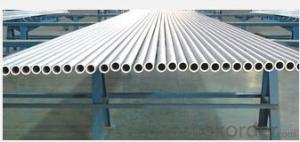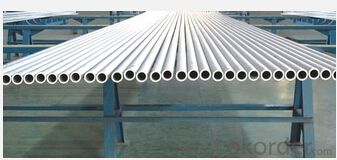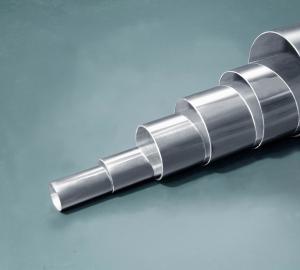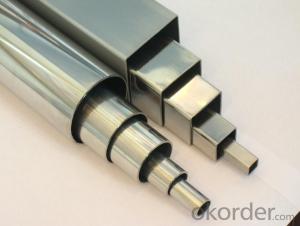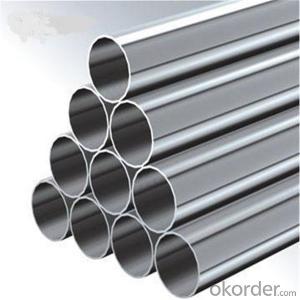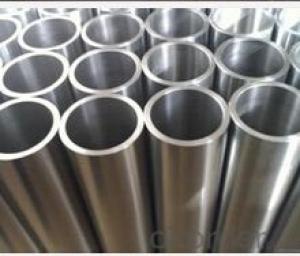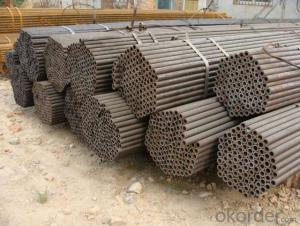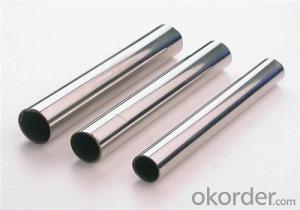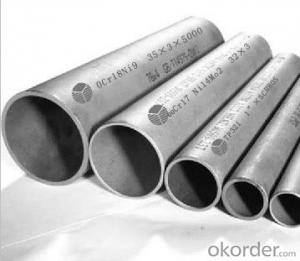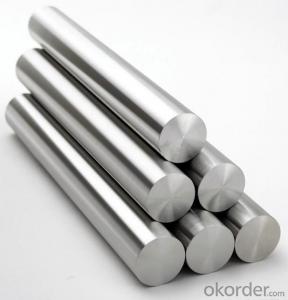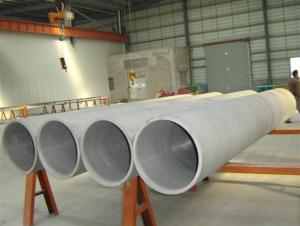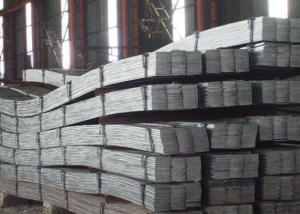seamless stainless boiler tubes
- Loading Port:
- China Main Port
- Payment Terms:
- TT OR LC
- Min Order Qty:
- -
- Supply Capability:
- -
OKorder Service Pledge
OKorder Financial Service
You Might Also Like
Specifications
seamless boiler tubesMaterial:304L,316L,316Ti,321,317L,310S,347H,904Letc.
Standard: A269, A213,
Cert:ISO
seamless boiler tubes
Material: 304L,316L,316Ti,321,317L,310S,347H,904L, 321 stainless steel welded pipe etc.
Standar duplex steel d: A269, A213, A312 201 stainless steel round tube
1. Material | TP304/304L, 316/316L, 310S, 317L, 321, 347H,etc. |
S31803, 32750, etc. | |
2. Sandard | ASTM, ASME, DIN, EN, ISO,JIS, GOST, etc. |
3. Type | Seamless |
4. Size rangetube | OD: from 6mm to 1000mm (NPS from 1/8'' to 40'') |
WT: from 0.7mm to 38mm (Schedule from 5S to XXS) | |
Length: fix length or un-fix length, Max 30meters | |
5. Produce process | Pilgering and cold drawn |
6. Surface process | Pickling and annealing |
AP tube | |
BA tube | |
7. Marking | JW, GRADE, seamless, STANDARD, SIZE, HT NO. |
8. Package | Bundles with waterproof cloth outside. |
or plywood box. | |
9. Min order quantity | 500 KG |
10. Sample | Yes |
11. OEM accepted | Yes |
12. Production capacity | 300 tons per month |
13. Payment term | T/T or L/C. |
14. Certificate | ISO 9001, PED |
15. Third party ertificate | BV, LR, SGS, TUV, CCS, ABS, etc. |
- Q: Can stainless steel pipes be mirror polished?
- Yes, stainless steel pipes can be mirror polished. Mirror polishing is a process that involves grinding down the surface of the stainless steel pipe until it is smooth and then using a series of polishing compounds to achieve a high gloss finish. This process can be done by hand or with the use of specialized machinery. The mirror polished finish not only enhances the aesthetic appeal of the stainless steel pipe but also provides added protection against corrosion and staining. However, it is important to note that the mirror polished finish may require regular maintenance to maintain its shine over time.
- Q: Can stainless steel pipes be used for cryogenic storage tanks?
- Yes, stainless steel pipes can be used for cryogenic storage tanks. Stainless steel is known for its high strength, corrosion resistance, and low thermal conductivity, making it suitable for handling extremely low temperatures required for cryogenic storage.
- Q: 304 stainless steel, welded to seamless difference in what place?
- Chemical composition of seamed pipe and seamless pipe are different. The production of seamless steel components only meets the basic requirements of astm. The production of seamed tube steel containing suitable for chemical composition of welding. For example, the mixing of silicon, sulfur, manganese, oxygen, and a certain proportion of elements such as the triangle ferrite can produce a welding flux which is easy to transfer heat during welding, so as to make the whole weld be welded well. The lack of steel pipe above the chemical components, such as seamless tube, can produce all kinds of unstable factors in the process of welding, welding and welding penetration is not easy.
- Q: Can stainless steel pipes be used for chemical processing?
- Yes, stainless steel pipes can be used for chemical processing. Stainless steel is known for its excellent corrosion resistance, making it a suitable material for handling various chemicals. It is resistant to both organic and inorganic chemicals, including acids, bases, and salts. Additionally, stainless steel pipes have high strength, durability, and temperature resistance, allowing them to withstand the harsh conditions often encountered in chemical processing. They are also easy to clean and maintain, making them a preferred choice in the industry. However, it is important to consider the specific requirements of the chemicals being processed and consult with experts to select the appropriate grade of stainless steel to ensure optimal performance and safety.
- Q: How do you prevent galvanic corrosion in stainless steel pipes?
- To prevent galvanic corrosion in stainless steel pipes, there are several measures that can be taken: 1. Use compatible materials: It is crucial to ensure that the materials used in the vicinity of stainless steel pipes are compatible to prevent galvanic corrosion. Avoid using dissimilar metals such as carbon steel, copper, or aluminum in direct contact with the stainless steel pipes. 2. Insulate dissimilar metals: If it is necessary to have dissimilar metals in close proximity to stainless steel pipes, electrical insulation can be employed. By isolating the metals electrically, the flow of electric current and subsequent galvanic corrosion can be minimized. 3. Apply protective coatings: Applying protective coatings, such as paint or epoxy, to the external surface of stainless steel pipes can act as a barrier against galvanic corrosion. These coatings prevent direct contact between the stainless steel and other metals that may cause galvanic reactions. 4. Use dielectric unions: When connecting stainless steel pipes to dissimilar metals, dielectric unions can be used to separate the metals and prevent galvanic corrosion. These unions incorporate insulating materials like plastic or rubber to prevent direct contact between the metals. 5. Implement cathodic protection: Cathodic protection is an effective method to prevent galvanic corrosion in stainless steel pipes. By introducing a sacrificial anode, such as zinc or magnesium, to the system, the anode corrodes instead of the stainless steel. This sacrificial anode can be periodically replaced to ensure continuous protection. 6. Install corrosion-resistant alloys: If the application allows, using corrosion-resistant alloys, such as duplex stainless steel or titanium, can provide enhanced protection against galvanic corrosion. These alloys have better resistance to galvanic reactions and are less prone to corrosion in various environments. Overall, a combination of these preventive measures can significantly reduce the risk of galvanic corrosion in stainless steel pipes, ensuring their longevity and performance. It is important to evaluate the specific application and environment to determine the most suitable preventive measures to be implemented.
- Q: Can stainless steel pipes be used for swimming pool installations?
- Yes, stainless steel pipes can be used for swimming pool installations. Stainless steel is a highly durable and corrosion-resistant material, making it suitable for use in swimming pool environments where there is constant exposure to water and chemicals. Stainless steel pipes are known for their longevity and ability to withstand the harsh conditions of a swimming pool, including chlorinated water and high temperatures. Additionally, stainless steel pipes are easy to clean and maintain, reducing the risk of contamination or blockages in the pool system. Overall, stainless steel pipes are a reliable choice for swimming pool installations due to their strength, resistance to corrosion, and longevity.
- Q: Can stainless steel pipes be insulated with polybutylene?
- No, stainless steel pipes cannot be insulated with polybutylene. Polybutylene is a type of plastic material that is commonly used as a water supply pipe. It is not suitable for insulating stainless steel pipes. Stainless steel pipes are already highly resistant to corrosion and do not require additional insulation for thermal purposes. If insulation is needed for stainless steel pipes, other materials such as fiberglass or foam pipe insulation can be used.
- Q: Are stainless steel pipes suitable for fertilizer production?
- Indeed, stainless steel pipes are a fitting choice for the production of fertilizers. The advantages they offer make them a preferred option for use in the fertilizer industry. To begin with, stainless steel pipes possess a high resistance to corrosion, which is particularly crucial in fertilizer production. Chemicals and substances used in this process, such as ammonia, sulfuric acid, and phosphoric acid, can be highly corrosive. Stainless steel pipes can endure the corrosive effects of these substances, ensuring the longevity and integrity of the piping system. Moreover, stainless steel pipes exhibit excellent strength and durability, enabling them to withstand the high pressures and temperatures commonly encountered in fertilizer production processes. This guarantees the secure and efficient transport of fertilizer materials within the production plant. Furthermore, stainless steel pipes are hygienic and easy to clean, which is essential for maintaining the purity of fertilizer products. The smooth surface of stainless steel resists the accumulation of bacteria, dirt, and other contaminants, ensuring that the pipes do not contaminate the fertilizer during production. Lastly, stainless steel is an environmentally friendly and sustainable material. It is fully recyclable, making it a more sustainable choice when compared to other pipe materials. Additionally, stainless steel has a long lifespan, reducing the need for frequent replacements and minimizing waste. To summarize, stainless steel pipes are highly suitable for fertilizer production due to their resistance to corrosion, strength, durability, hygienic properties, and environmental benefits.
- Q: Are stainless steel pipes suitable for food and beverage processing?
- Yes, stainless steel pipes are highly suitable for food and beverage processing. They are corrosion-resistant, easy to clean, and do not leach any harmful substances into the products being processed. Additionally, stainless steel pipes maintain the quality and taste of the food and beverages, making them a popular choice in the industry.
- Q: What are the different finishes available for stainless steel pipes?
- There are several different finishes available for stainless steel pipes, each offering its own unique look and level of corrosion resistance. 1. Brushed Finish: This finish is achieved by brushing the surface of the stainless steel pipe with a fine abrasive material, resulting in a dull, textured appearance. It effectively hides scratches and fingerprints, making it a popular choice for applications where aesthetics are important, such as architectural projects. 2. Mirror Finish: Also known as a polished or reflective finish, this is achieved by polishing the surface of the stainless steel pipe to a high shine. It provides a smooth, reflective surface that is easy to clean and is commonly used in decorative applications, such as handrails and furniture. 3. Satin Finish: Similar to the brushed finish, the satin finish is achieved by using a fine abrasive material to create a smooth, dull appearance. It offers a slightly more refined look compared to the brushed finish and is commonly used in applications where corrosion resistance is important, such as in the food and beverage industry. 4. Embossed Finish: This finish involves imprinting a pattern onto the surface of the stainless steel pipe, adding texture and visual interest. It is often used in decorative applications, such as wall panels or elevator interiors. 5. Bead Blasted Finish: This finish is achieved by propelling small glass beads at high pressure onto the surface of the stainless steel pipe. It creates a uniform, matte appearance and is commonly used in architectural applications, as it provides a unique texture and hides fingerprints well. 6. Passivated Finish: Passivation is a chemical process that removes contaminants from the surface of the stainless steel pipe, improving its corrosion resistance. This finish is commonly used in applications where stainless steel pipes are exposed to harsh environments or chemicals. It is important to note that the choice of finish for stainless steel pipes depends on the specific application and aesthetic preferences. Each finish has its own advantages and disadvantages, so it is essential to consider factors such as durability, maintenance, and the intended use of the pipe before making a decision.
Send your message to us
seamless stainless boiler tubes
- Loading Port:
- China Main Port
- Payment Terms:
- TT OR LC
- Min Order Qty:
- -
- Supply Capability:
- -
OKorder Service Pledge
OKorder Financial Service
Similar products
Hot products
Hot Searches
Related keywords
